CRUISING THE COSMERE Oathbringer (BOOK REVIEW)
Given the immensity of Oathbringer, this is probably one of the hardest books I’ve reviewed this year, and therefore I’m going to largely be concentrating on my most memorable scenes and other aspects I have loved because this book has sent me through a rollercoaster of emotions. I have laughed, cried, worried and often been left astonished by these characters and their lives. The world of the Stormlight Archives now holds a special place in my heart, and the journey is far from over.
Before I begin please note that this review contains spoilers for Words of Radiance and for Oathbringer.
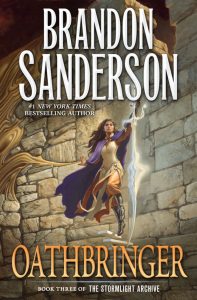 The Everstorm has come, the Voidbringers have returned, the Desolation is nigh, and the world of Roshar stands in dire peril. In this next instalment of the Stormlight Archives series by Brandon Sanderson we see our main protagonists sheltered in the fabled lost city of Urithiru where they continue their quest to unite Alethkar, to unlock the secrets of the Voidbringers and prepare for the ultimate battle which may change the face of the world entirely.
The Everstorm has come, the Voidbringers have returned, the Desolation is nigh, and the world of Roshar stands in dire peril. In this next instalment of the Stormlight Archives series by Brandon Sanderson we see our main protagonists sheltered in the fabled lost city of Urithiru where they continue their quest to unite Alethkar, to unlock the secrets of the Voidbringers and prepare for the ultimate battle which may change the face of the world entirely.
As with each book, Sanderson dedicates flashback scenes to one singular significant character, and this time it is Dalinar’s turn. During the previous two books it has been consistently mentioned that Dalinar’s past as the infamous Blackthorn, which has been erased from his memory, very much contrasts the man we see in the ‘present day’. Therefore I have been highly anticipating seeing exactly what his character once was like. Well goddamn, after reading only one flashback chapter I immediately discovered how stark that contrast truly was! Dalinar, who we know as a man of honour and virtue, very much had departed from his younger self who was full of ruthlessness and savagery. The contrast was so abrupt, it actually made for many humorous moments and I do love a bit of dark humour. Yet beneath this humour we see a villainous side to Dalinar too. Sanderson shows us how he is a terrifying warrior capable of losing himself to the Thrill in battle, painting a landscape in blood, killing all in his way, without mercy.
‘Within moments he was roaring his pleasure. Nothing these men did could touch him. He was a destroyer, a conquerer, a glorious maelstrom of death. A god.”
However, Sanderson doesn’t allow Dalinar’s past to leave him unscathed or leave his deeds unaccounted for, as once his memories begin to return, Dalinar must learn to live with the guilt and accept the person he once was. I found one particular philosophical scene in chapter twenty-eight really fascinating. You see, Amaram accuses Dalinar of being a hypocrite, and whilst I despise Amaram’s character, I also can’t help but agree with him. Dalinar stands upon a legacy of corpses, and to see him now drive for peace and unity, well, you can understand why the other city leaders are reluctant to trust him. Yet we the reader know that Dalinar is earnest in his fight to save Alethkar and he truly is a great leader; there is something so charismatic about his character where you cannot help but feel empathy towards him. Which is where Sanderson makes us feel conflicted; we know that Dalinar is certainly no ‘shining white knight’ hero but he is the right man for this task. As Dalinar struggles with these demons, his bond with The Stormfather provides some lovely poignant exchanges, which I also found thoroughly engaging.
‘“You are not a hypocrite, son of Honor.”
“I am,” Dalinar said softly. “But sometimes a hypocrite is nothing more than a person who is in the process of changing.”
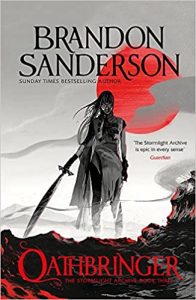 I feel the notion of accepting yourself and discovering who you truly are is a prominent theme throughout this book, as further illustrated through Shallan‘s character. In Words of Radiance, we had an in-depth view into Shallan’s traumatic past, we see that she is full of darkness, sorrow and self-hatred. In Oathbringer she creates a variety of persona‘s for herself using her Lightweaving abilities, and at will she turns herself into Radiant, Veil or Shallan. These illusions allow her to bury her distressing childhood memories and become other, stronger, capable versions of herself. However, the more Shallan relies on her personas, she begins to lose her own identity and becomes absorbed in her own lies. I absolutely love the way Sanderson explores mental health, he illustrates the need to escape from your own traumatic memories, the way fear and loneliness can consume us; he takes those notions and shows us that despite whatever life throws at us, there is always hope, always light. It is a sentiment which I feel we all need to be reminded of.
I feel the notion of accepting yourself and discovering who you truly are is a prominent theme throughout this book, as further illustrated through Shallan‘s character. In Words of Radiance, we had an in-depth view into Shallan’s traumatic past, we see that she is full of darkness, sorrow and self-hatred. In Oathbringer she creates a variety of persona‘s for herself using her Lightweaving abilities, and at will she turns herself into Radiant, Veil or Shallan. These illusions allow her to bury her distressing childhood memories and become other, stronger, capable versions of herself. However, the more Shallan relies on her personas, she begins to lose her own identity and becomes absorbed in her own lies. I absolutely love the way Sanderson explores mental health, he illustrates the need to escape from your own traumatic memories, the way fear and loneliness can consume us; he takes those notions and shows us that despite whatever life throws at us, there is always hope, always light. It is a sentiment which I feel we all need to be reminded of.
One of my favourite chapters within the book was where Shallan reaches breaking point, and Wit comes to show her that life is a series of joys and hardships and she must learn to accept her pain but not believe she deserves it, that she is not the monster she perceives herself to be. It is a beautiful and tender moment where we see Wit in a completely new light, and I was in absolute tears reading it.
Wit – “If you do not trust yourself, can you trust me? For in you, I see a woman more wonderful than any of the lies. I promise you, that woman is worth protecting. You are worth protecting.”
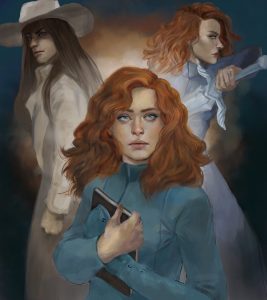
Shallan/Veil/Radiant fan art by @zirael_art (instagram)
We also see Sanderson explore mental health through Kaladin’s character, who suffers from PTSD and depression. Personally I feel we observe much growth from Kaladin in Oathbringer, he seems to gain such confidence with his Windrunner abilities and as his role as Captain of the King’s guard. We even glimpse rare moments of happiness from him, particularly when he goes to visit his mother and father in his home village. It is an endearing scene where we finally see Kaladin share the weight of his brother, Tien’s, death. Yet Sanderson doesn’t portray trauma or depression as something that ‘just goes away’, it unfortunately stays with you and can be triggered at any given time, it can debilitate you and leave you numb. Which is exactly what happens to Kaladin during a crucial moment at the battle for Kholinar. I very much appreciate and respect Sanderson for representing mental health conditions so meticulously, it is what makes his characters undeniably relatable.
So far I have made Oathbringer sound like a heavy and intense read, which for the majority of the narrative it is. However there are also brilliant moments of humour laced throughout too! For example, Kaladin and Shallan share hilariously awkward conversations with their sprens Syl and Pattern, who have no inhibitions or ideas of boundaries, concerning sex. Adolin’s obsession with the latest fashion trends was so amusing, especially because Kaladin for the life of him couldn’t comprehend why it was so important to Adolin! This time around we also get POV’s from members of Bridge Four and as ever their banter, particularly from Rock and the Lopen, provided the best laugh out loud moments.
Then we are treated to some sharp witted mockery from Jasnah, who thankfully returns – Storms how I’ve missed her! I may not always agree with Jasnah’s views but I love her character nonetheless. Jasnah is the staple for never conforming to stereotypes, to not giving a damn how people view her, and for being so highly intelligent. In fact it is rare to see her lose her composure, but in this particular scene where Amaram makes advances on her, my god did she cut him down!
‘“You godless whore,” Amaram hissed, releasing her. “If you weren’t a woman…”
“If I weren’t a woman, I suspect we wouldn’t be having this conversation. Unless I were a pig. Then you’d be doubly interested.”’
Once again Sanderson revels in the fantastical and treats us to many visually cinematic episodes, and if you know me, you’ll know I am always in favour of magical battle scenes against monsters! Among some of my favourite chapters were; Shallan facing the first unmade we encounter – the Midnight Mother, Kaladin holding back the highstorm, our young protagonists entering Shadesmar, and toward the end when Adolin thrillingly battles against a Thunderclast. We also visit many of the eclectic cities of Roshar and in turn gain a better understanding of the various cultures within this hugely diverse world.
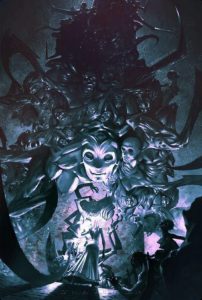
Fan art of the Midnight Mother by Petar Penev (@panevpetar – Twitter)
As much as the Stormlight Archives appears to be a hero’s journey – a quest to conquer evil, to fight for freedom, I commend Sanderson for blurring the lines on who exactly is the evil party within this world. In Oathbringer we meet several characters such as Odium, some of the Unmade and the Fused, who in retrospect are somewhat easier to define as villains as their actions are more malignant. However, when Kaladin meets a group of Parshendi and discovers they are not all the ruthless killers they have been led to believe, and particularly when we meet Venli’s character, Sanderson shows us a race who have been oppressed for many years and forced to become slaves on a land that was originally theirs. Akin to the Alethi race, the Parshendi too have families, they have aspirations for a better life, one where they have power, and therefore we now view the Parshendi in a new light. Dare I say, even sympathise with them. Along with many of the the characters, we too feel conflicted about who’s side to take, which elevates this series even further into an engrossing philosophical read.
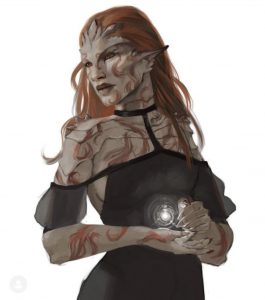
Venli Fan Art by @zirael_art (instagram)
I realise Oathbringer has been criticised by many for being the weakest book in the series, perhaps due to its slower pace and scenes that were perceived as more ‘filler’ than progression. Although I’d agree that the character arcs don’t move on very much, I honestly didn’t mind it one bit, in fact I was entirely captivated from beginning to end. Perhaps this was because I’m extremely attached to these characters and this world now, and I’m the type of reader who loves to feel that connection, therefore I was content with following them even through the more stagnant scenes. It also helped that we learn an abundance about the world of Roshar, big revelations come, and there is one hell of a Sanderlanch ending! Sanderson is the kind of author who has me hanging onto every ounce of information, he keeps me fascinated, and I’m always left craving for more.
“I will take responsibility for what I have done.” Dalinar whispered. “If I must fall, I will rise each time a better man.”
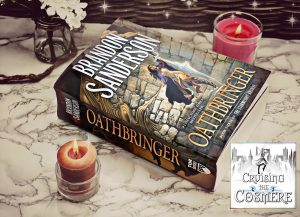

[…] ‘Sanderson is the kind of author who has me hanging onto every ounce of information, he keeps me fascinated, and I’m always left craving for more.’ — Fantasy Hive […]
[…] ‘Sanderson is the kind of author who has me hanging onto every ounce of information, he keeps me fascinated, and I’m always left craving for more.’ — Fantasy Hive […]